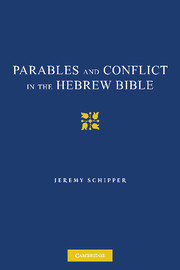Book contents
- Frontmatter
- Contents
- Preface
- Abbreviations
- 1 Breaking Down Parables: Introductory Issues
- 2 Devouring Parables: Jotham's Parabolic Curse in Judges 9
- 3 Overallegorizing and Other Davidic Misinterpretations in 2 Samuel 11–12
- 4 Changing Face and Saving Face: Parabolic Petitions in 2 Samuel 14
- 5 Grasping the Conflict: Ahab's Negotiation of Conflicts and Parables in 1 Kings 20
- 6 Intellectual Weapons: The Parable's Function in 2 Kings 14 and 2 Chronicles 25
- 7 Conclusions and Implications for the Study of Hebrew Bible Parables
- Notes
- Works Cited
- Scriptural and Extra-Biblical Texts Index
- General Index
3 - Overallegorizing and Other Davidic Misinterpretations in 2 Samuel 11–12
Published online by Cambridge University Press: 30 September 2009
- Frontmatter
- Contents
- Preface
- Abbreviations
- 1 Breaking Down Parables: Introductory Issues
- 2 Devouring Parables: Jotham's Parabolic Curse in Judges 9
- 3 Overallegorizing and Other Davidic Misinterpretations in 2 Samuel 11–12
- 4 Changing Face and Saving Face: Parabolic Petitions in 2 Samuel 14
- 5 Grasping the Conflict: Ahab's Negotiation of Conflicts and Parables in 1 Kings 20
- 6 Intellectual Weapons: The Parable's Function in 2 Kings 14 and 2 Chronicles 25
- 7 Conclusions and Implications for the Study of Hebrew Bible Parables
- Notes
- Works Cited
- Scriptural and Extra-Biblical Texts Index
- General Index
Summary
“How good and delightful it is when kin dwell together in unity!”
–Psalm 133:1b“[T]he fable, according to its proper character, does not pursue moral goals but tries simply to present a truth, a reality, something as typical and which is as it is. Frequently, the discourse of the truth drives it into the realm of cruelty.”
–Gerhard von Rad, Wisdom in IsraelThe parable that Nathan tells David in 2 Sam 12:1b–4 is arguably the best known parable in the Hebrew Bible. It reads:
Two men were in one city; one rich and one poor. The rich one had very many flocks and cattle, but the poor one had nothing except one small ewe-lamb that he purchased. He raised her. She grew up with him and his sons together. From his morsel she ate, from his cup she drank, and in his bosom she slept. She was like a daughter to him. Now a traveler came to the rich man, but it seemed a pity to him to take from his own flocks and cattle to prepare for the wayfarer who came to him. Instead, he took the poor man's ewe-lamb and prepared her for the man who came to him.
Many readers can connect the parable to the events of the previous chapter (2 Samuel 11) concerning David and Bathsheba even before Nathan makes these connections in vv. 7–12. Israel's war with Ammon provides the setting for the events in 2 Samuel 11.
- Type
- Chapter
- Information
- Parables and Conflict in the Hebrew Bible , pp. 41 - 56Publisher: Cambridge University PressPrint publication year: 2009



